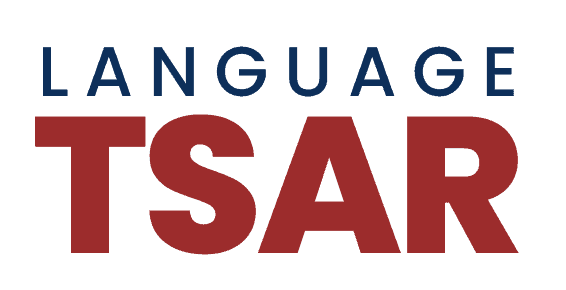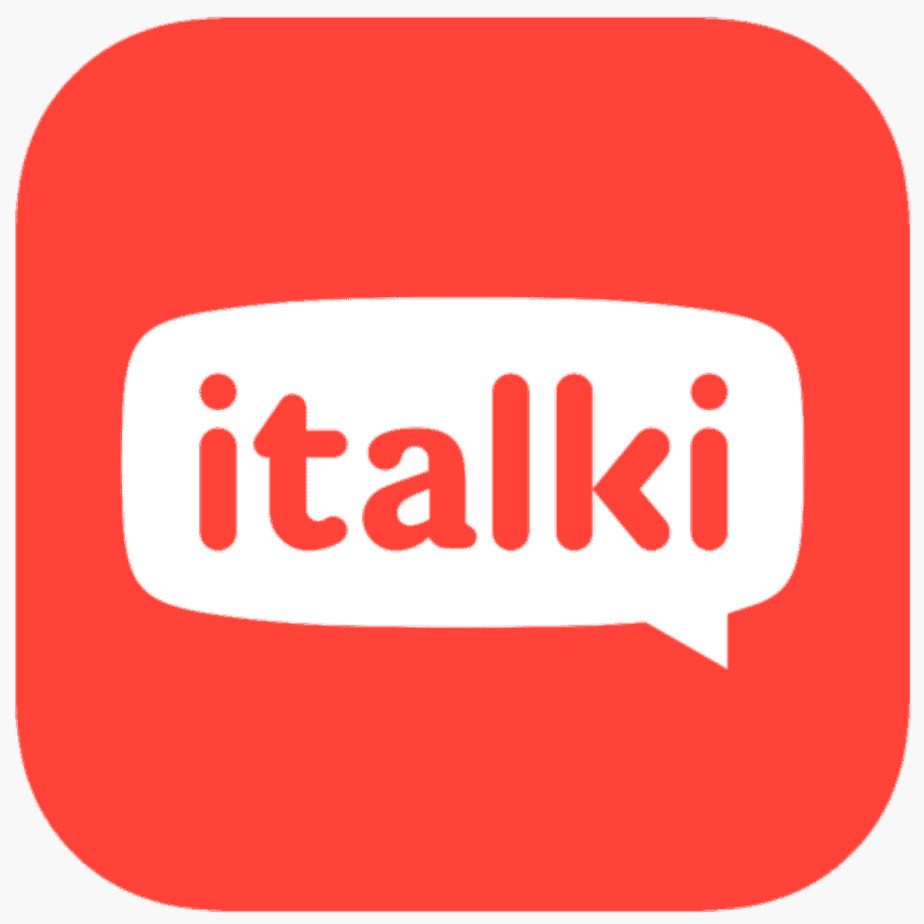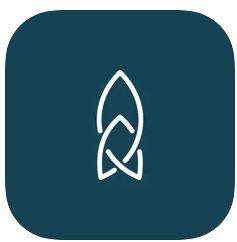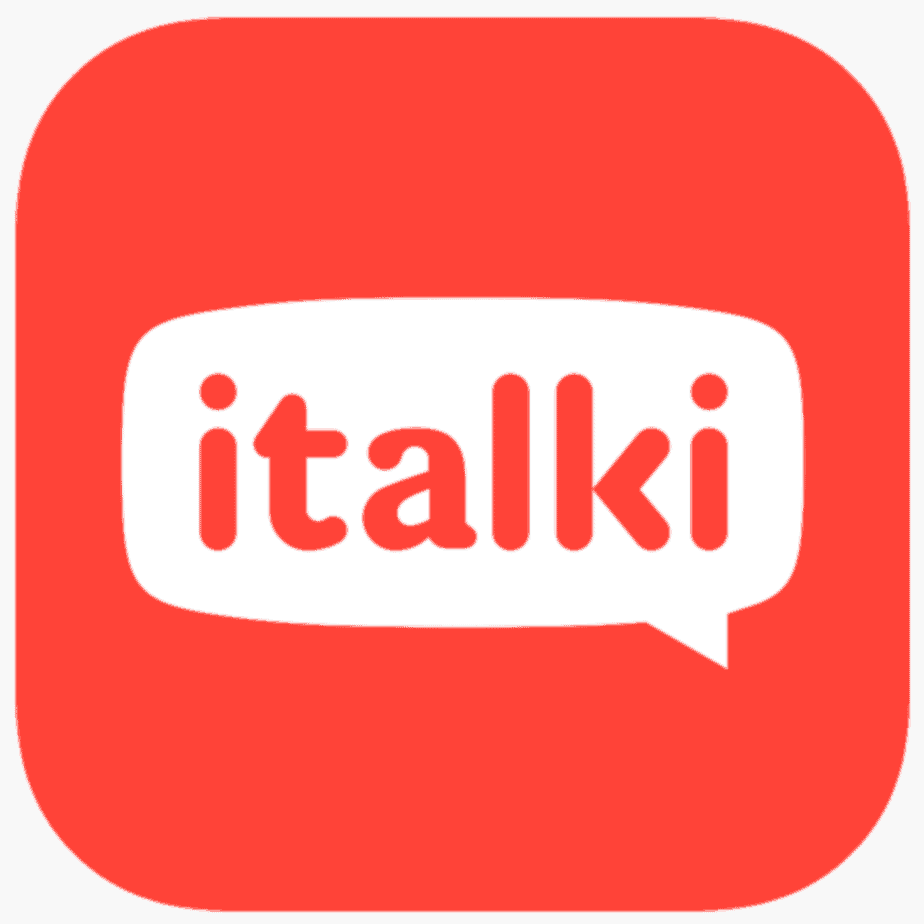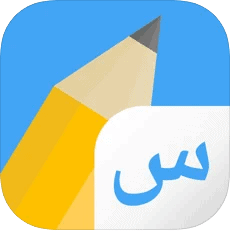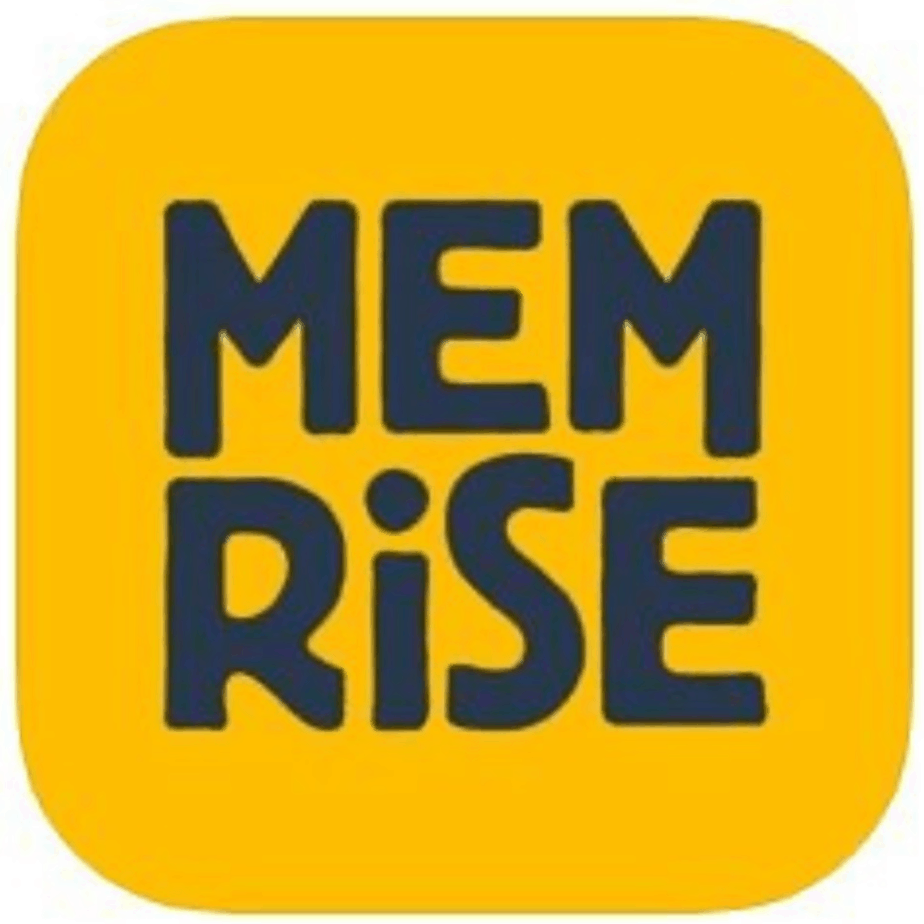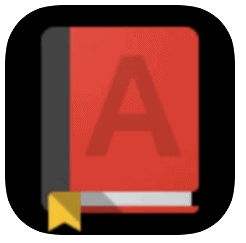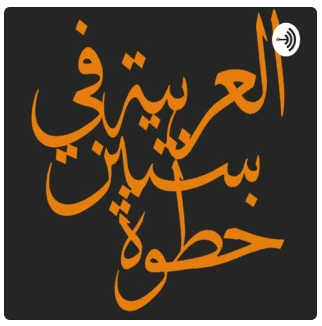- Editor's Choice
A flexible Arabic course, catered to your specific needs and interests, delivered by energetic & professional tutors.
- 2nd Choice
A solid choice for those looking for a more structured syllabus that teaches through real-use dialogues.
- 3rd Choice
An affordable option to start conversing with native speakers from day one, fitting around your busy lifestyle.
Editor’s Note: This list of our 5 Best Apps for Learning Arabic is up-to-date as of August, 2021.
Arabic is arguably one of the world’s most beautiful languages, known for its intricate poetry and ancient entrenched culture & beliefs.
For instance, did you know that Arabic has around 14 words for ‘love’? Each specific word describes a different stage of ‘falling in love’, from هواة (hawa) – the initial attraction, to عشق (ishq) – a passionate & blind desire.
Arabic is also notoriously difficult to learn. However, more people are becoming fluent than ever before in this widespread and unique language, opening the doors to communicate with over 300 million people (the average number of Arabic speakers worldwide)!
The reason for this boom in language learning is down to technology. Today we have access to hundreds of interesting, engaging and immersive apps to connect with native speakers and start learning Arabic, something that was never before possible.
These apps allow you to study completely on your own time, zoning-in on your specific passions and interests – a supercharged way of learning that’s fun, interactive and accessible to anyone with a smartphone.
In this article, we’re going to take a close look at what we believe to be the best apps for learning Arabic. We’ll show you how they work, and why. So without further ado, let’s go!
Yalla!
5 Best Apps for Learning Arabic
(Android, iPhone, iPad)
Monthly subscription starts from $8/month, 7 day free premium trial
The Most Comprehensive & Flexible App
ArabicPod101 is an app that was created by Innovative Language, a company that has a reputation for creating high-quality and highly comprehensive language programs. They are unique in the fact that they allow the learner to customize their own learning syllabus based upon their learning needs and interests. You can filter their vast library of lessons by skill type or category and add specific learning ‘pathways’ to your dashboard, where your learning will be tracked.
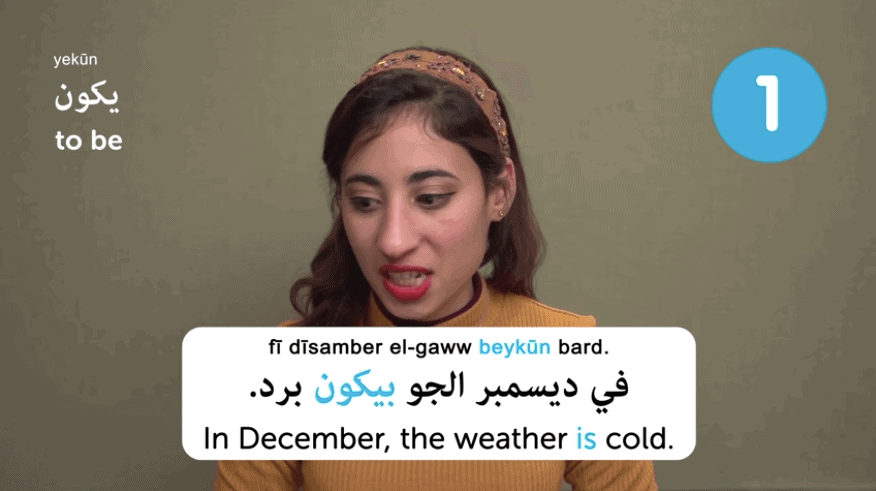
Each lesson has either a video or podcast (hence the name), delivered by native speakers in a fun & professional manner, with lots of cultural notes and examples. You are then provided with a line-by-line dialogue, vocab list, and comprehensive lesson notes. Additionally, you’ll find that the app includes flashcards, word banks, common word lists, and a dictionary – super useful!
Pros
- Fun & playful content with lots of interesting topics
- You are not restricted to a specific syllabus - you can jump around as you please
- A large range of extra vocab tools & features
Cons
- The lower levels can feel a bit slow & explanation heavy - not enough immersion in our opinion
- The lack of a structured overall syllabus can be worrying to some who prefer a step-by-step approach
Price:
Effectiveness:
User Experience:
(Android, iPhone, iPad)
$19/month, $99.95 for lifetime access, 60-day refund policy
Best Alternative to ArabicPod101
For those who prefer a step-by-step pre-made syllabus that they can easily follow along to, Rocket Arabic may be the app for them. The lessons are very thorough, starting off with the absolute basics (including the alphabet) and working their way towards longer and more complex sentences.
Like ArabicPod101, they use dialogues a lot to show you the language in context. Plus, you can even take part in the dialogue by recording yourself and listening to the other voice – almost like a real conversation!
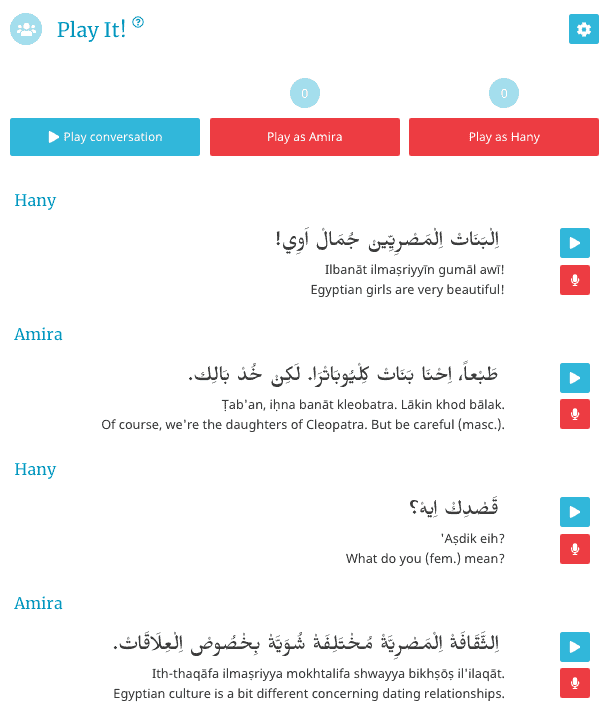
Do note, however, that they focus solely on the Egyptian dialect which differs from other forms of Arabic. In our opinion, this is actually a big advantage since the vast majority of Arabic media is in the Egyptian dialect.
Despite some attempts to gamify the app by using streaks and activities (like Duolingo), in general, Rocket Arabic is a bit more bland, with lots of information and generic lesson layouts. However, for some learners, this is exactly what’s needed.
Pros
- All content can be downloaded offline
- Generous refund policy and free trial
- Simple and intuitive mobile app
Cons
- Many of the forums are outdated or obsolete
- The exercises can become very monotonous
- They currently offer only one level - not suitable for advanced learners
Price:
Effectiveness:
User Experience:
(Android, iPhone, iPad)
Free, tutor prices vary
Best for Conversation Practice
Itali is the absolute go-to for when you know some phrases down already and are ready to start practicing! Even if you don’t know much, it’s a great idea to start speaking with native speakers as soon as possible to get a feel for the sounds and culture. Italki is a brilliant option for this – it pairs you up with a tutor who can fit around your lifestyle to teach you/talk with you in Arabic. As long as you have internet & your smartphone you can practice what you’ve learnt and get instant feedback from a native speaker.
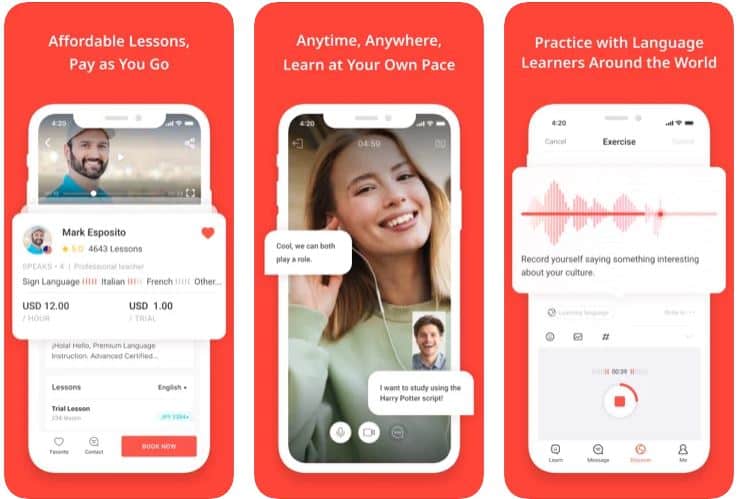
The only thing to bare in mind is that your tutor might not always have a clear plan for your learning – it’ll normally be a bit of back and forth. So come to your sessions prepared with maybe a topic or set of vocabulary you’d like to practice and use within your conversations. Your italki tutor will be more than happy to accommodate your needs.
Pros
- Affordable tutoring service
- Sessions can be scheduled around your busy schedule as often as you like
- Wide choice of tutors available
Cons
- It can take time to find the right tutor for you
- Not all tutors will follow a strict syllabus or lesson structure
Price:
Effectiveness:
User Experience:
(Android, iPhone, iPad)
Free
Best App for Mastering the Arabic Alphabet
For many new students, learning the Arabic script is the biggest hurdle. With its 28 unique characters, and being a cursive script, each letter effectively has up to 4 different forms. It’s the most widely used alphabet in the world so it’s of surprise that there’s some amazing apps available to really master this difficult script in a fun & enjoyable way.
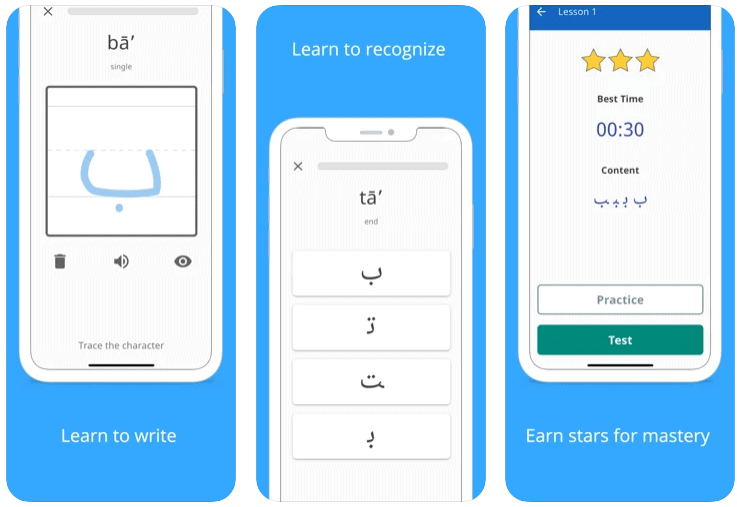
‘Write it! Arabic’ is a clever little app that slowly introduces each letter in all its forms, associating the script to its accompanying sound and example words. You are eventually pushed to write the characters all by yourself, using your finger as a stylus. They have a fun, game-like system to keep you motivated and eager to push onto the next level. Many learners have reported to have learnt the entire alphabet in days – far more effectively than any other mainstream language course like Duolingo or Rosetta Stone.
Pros
- Teaches you the single, initial, median and end part of each letter
- It orders the letters by most memorable/logical first
- Uses clever software to give instant feedback on your writing
Cons
- The app teaches nothing beyond the alphabet
- It'd be nice to see a variety of fonts and writing styles
Price:
Effectiveness:
User Experience:
(Android, iPhone, iPad)
Free, or $18.99/month or $8.99/month (annual) for Memrise Premium
Most Fun/Gamified
Memrise is not too dissimilar to Duolingo, but far higher quality. Whilst Duolingo can’t be beaten as a free resource, the usefulness of Memrise is well worth the price. Firstly, they have a massive range of books at just the right level for you, in addition to frequency word lists, writing exercises, and more. And we haven’t even mentioned the official course yet!
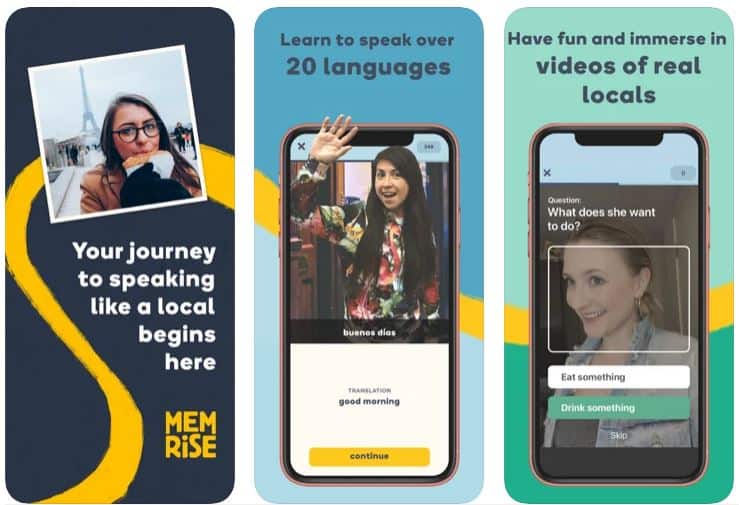
The app is generally very well designed, effortlessly guiding you onwards between levels and learning resources. It’s been gamified, just like Duolingo, so beware – it can get very addictive! The main difference with Duolingo is the large amount of videos and dialogues, rather than isolated sentences. This really puts the language into context and shows you how everything is used in real-life scenarios.
Pros
- Really sleek looking app
- Most useful for learning new vocabulary (uses SRS)
- Very interactive and fast-paced
Cons
- It's not enough for high level learners beyond an intermediate level
- The premium version is quite costly compared with other apps
Price:
Effectiveness:
User Experience:
Runners-up for Best App for Learning Arabic:
This list is by no means exhaustive – there’s just so many good apps out there we had to include these additional runners up. Enjoy!
(Android, iPhone, iPad)
Free, $5.68/month for Premium
The Best App for Getting Quick Answers From Native Speakers
Often the best resource for learning a new language is not language courses, nor dictionaries. Not even books or podcasts – but real native speakers. Why? You see language is not like a static book, but more like a wiggly tangle of forever evolving sayings, phrases, words and sentence patterns. Often you might be grammatically correct but to a native, it’ll simply sound off or incorrect.
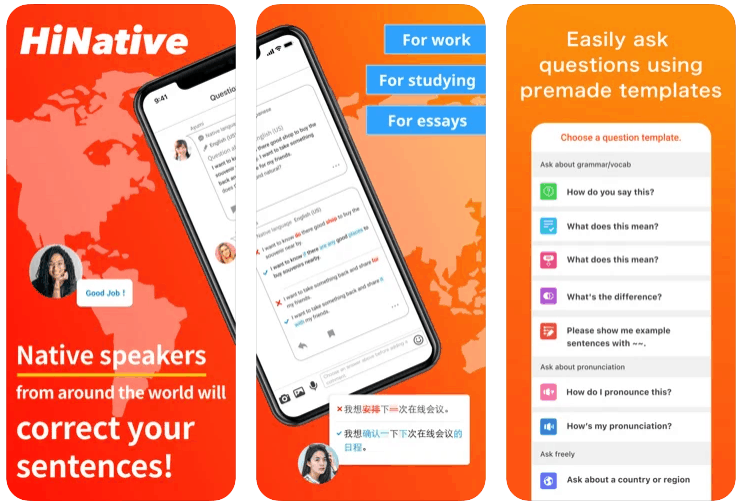
HiNative is the holy grail of error correction and for getting clarification on how native Arabic speakers actually speak. Within the app you can ask any question and get an answer in real-time on any topic, from grammar to idioms. You can even record yourself and get feedback on pronunciation and accent – for free!
Pros
- Simple app, easy to use
- Can record your own voice
- Built-in error correction and feedback
Cons
- Not all the responses are correct
- Won't replace a language course by itself
Price:
Effectiveness:
User Experience:
(Android, iphone, ipad)
$350 for levels 1-3, or $150 per level
Best App to Develop Conversational Speaking Skills
The Pimsleur course, with its accompanying app, is a proven program to get you speaking from day 1 and absorbing the language through an intuitive step-by-step approach. The course is entirely audio based (good news for those who do sports or can listen on their daily commute) and is based entirely upon scientific research by Dr Pimsleur.
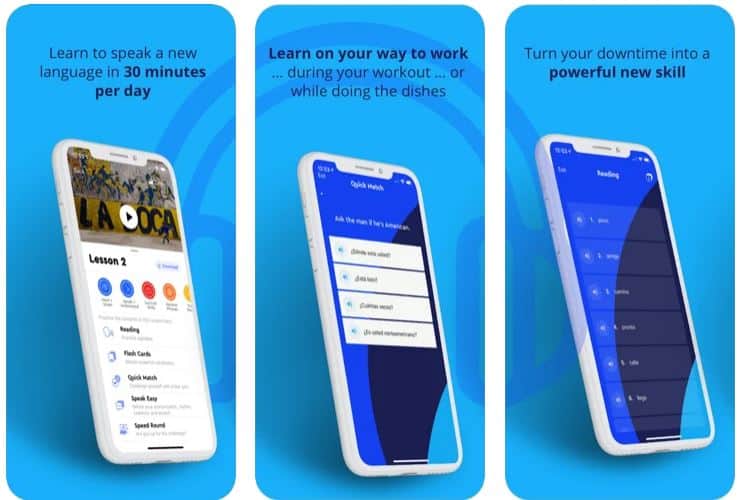
Each 30-60 minute lesson first immerses you in an authentic dialogue by native speakers, and then proceeds to break it down line-by-line, then each word, and each individual sound. This way, you can ensure that your pronunciation is spot on, as you memorize entire phrases within a real-use dialogue. By the time the lesson is up, you’ll find yourself recalling useful phrases in Arabic with accurate pronunciation.
Pros
- Uses SRS to solidify phrases into your memory
- Based upon research by Dr Pimsleur
- The app is easy to use and even features a 'driving only' mode
Cons
- Teaches speaking/listening only - nothing for reading & writing
- The topics are not as interesting as ArabicPod101
- Quite costly
Price:
Effectiveness:
User Experience:
(Android, iphone, ipad)
Free
Best Dictionary App for Arabic
For Arabic learners, having a good dictionary app on hand is crucial when looking up the meanings of new words and how to use them properly. As your level increases, you can no longer rely on google translate with its oversimplifying algorithm, but rather we recommend the Hans Wehr app, developed by Gibreel Abdullah
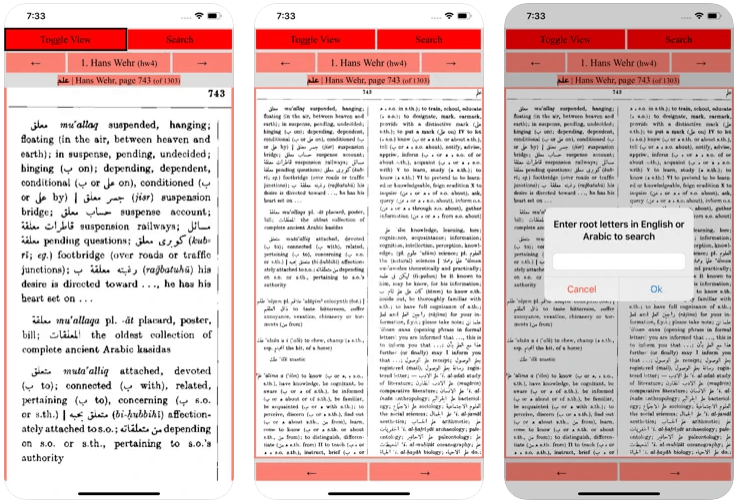
Unlike other online dictionaries, Hans Wehr allows you to search using only the root letter of the word – perfect for understanding the conjugations and tenses. Furthermore, the app will indicate the vowels and prepositions – something that’s very useful for all Arabic students at any level.
Pros
- Available offline
- You can search in roman letters if you wish (arabic keyword isn't necessary)
- Words are organised by their roots
Cons
- The interface could be nicer (though not a deal-breaker)
- No additional features or learning tools
Price:
Effectiveness:
User Experience:
(Android, iphone, ipad)
Free
Best Beginner-level Podcast for Arabic Students
Sam is an experienced teacher and has a brilliant podcast dedicated to those who are learning Arabic. Despite him not being a native speaker himself, he’s dedicated years of his life to learning this beautiful language, and his podcast is very popular. He speaks mostly in English, which is very useful for those starting out, though more advanced learners might be eager to find something more immersive.
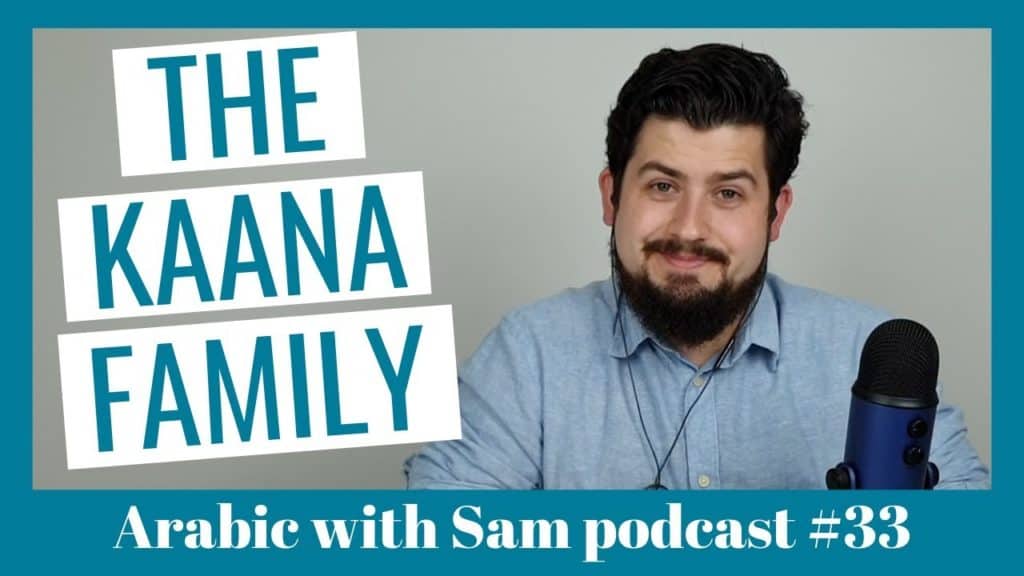
He has a massive library of episodes of all different lengths, so you can find something perfect for at the gym, or when driving to work. Through his podcast you learn about how the grammar works, learn tongue twisters, and read the book Aladdin.
Pros
- He has a brilliant 60 steps program
- It's completely free!
- Very beginner friendly
Cons
- It's mostly in English
- Reccomended for beginners only
Price:
Effectiveness:
User Experience:
The Best Apps For Learning Arabic: Conclusion
We hope that you’ve enjoyed this digital rollercoaster ride, showcasing to you a ton of different mobile apps to help you learn Arabic – from podcasts (ArabicPod101) to games (Memrise), from forums (HiNative) to dictionaries (Hans Wehr).
Each app has its own use and function, for example ‘Write it! Arabic’ is designed solely for teaching you the Arabic script (and does a very good job at it).
Overall, we recommend commiting to one main course-type app such as ArabicPod101 or Rocket Arabic, and then using the others alongside as supplementary tools as you see fit. But most of all, we hope you have lots of fun along the way!
Good luck!

Josiah is a digital nomad with a passion for language learning and adventure travel. He’s taught English as a foreign language for many years and is currently learning Georgian, French and Chinese.

